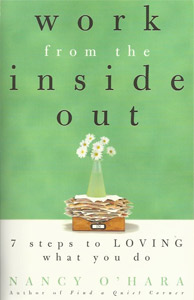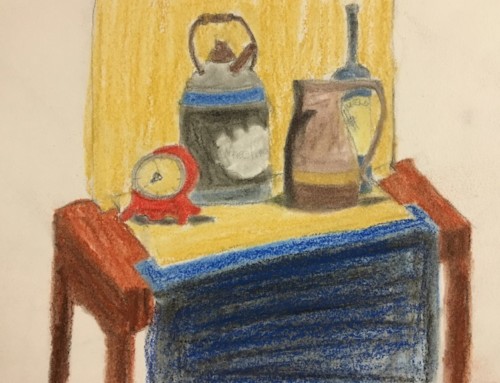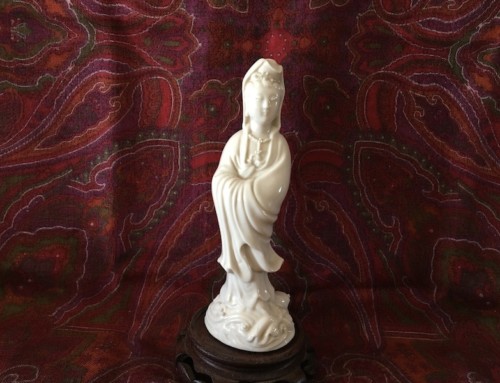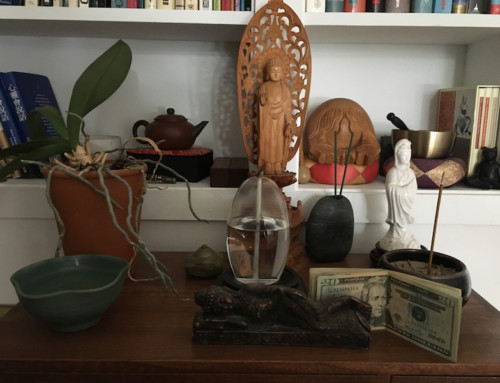…continued from Three Bogeymen of Serenity
Perhaps the most crucial impediment that we need to cast away as we progress toward the realization of our true work and enjoyment of it is our dualistic thinking. This operates everywhere and becomes especially vivid when we consider our status in the workplace.
When we are young we may or may not know what we want to do when we grow up, but we are certainly encouraged to think about it. And usually our visions of the future are quite grand whenever we playact our dreams. This fantasizing isn’t in itself a bad thing, but sometimes when we are middle-aged we ask ourselves: “What happened?” We sense dissatisfaction; we look around and cannot help but compare our place in life with that of others (especially as it relates to work). And because of the nature of organizations and the inherent hierarchy, most of us feel disappointment, particularly if we are or once were ambitious. There is always someone doing better, there is always someone higher, happier, healthier. However we describe what we see, if we are unhappy, our situation is bad and any other situation is good. We decide that we have failed and wonder where we went wrong. On top of this we are bombarded daily by the media with images of successful people. We look toward celebrities to assist us in making life choices, and then when we look back at ourselves we can’t help but be disappointed.
We may be doing exactly what we were meant to do, exactly what we’ve always wanted to do, but we end up not enjoying it because it just isn’t enough.
Betty’s Story
Betty is at a point in her life where all she can see is failure, even if that isn’t the truth. As she approaches two very significant anniversaries, Betty finds herself reflecting on three important questions of life: “Who am I? Where am I from? Where am I going?”
Anniversaries and birthdays mark the passage of time and are potent opportunities for us to reflect on the impermanent nature of life.
Some of us shy away from celebrating these events either because we usually end up disappointed (that is, we set up high expectations and never get what we want) or we would rather not face the natural process of aging. But whether we acknowledge them or not, these markers are there, beating time, so better to celebrate than deny them. Betty will soon mark sixteen years of freedom from a serious addiction to drugs and alcohol and next year will turn fifty years old. But Betty is not in a mood to celebrate, stuck as she is in self-doubt, loathing and fear.

The Big City
First, let’s take an objective look at Betty’s life. A talented writer, performer and comedienne, Betty has for most of her adult life worked in the creative world of theatre. It is her passion. Some of the highlights of her past: she designed and crafted lifelike doll-puppets that were displayed and sold in several Manhattan storefronts; she toured and performed for many years with a prominent children’s theatre company; wrote, produced and performed several of her one-woman shows in New York City and Boston.
Today Betty is a veteran and core member of a small ensemble theatre group in Manhattan that each week performs its own original material. Some members of the company have moved on and are enjoying successful careers on network television. Recently Betty produced and starred in two of her own one-act plays, has since expanded one of them and will stage it again soon. This play has caught the interest of a literary agent and Betty is working on a proposal to turn it into a book. Betty owns an apartment in New York and is president of her co-op board. She has also successfully conquered her addiction to drugs and alcohol, one day at a time, and will soon have under her belt as many years sober as she spent drunk—an impressive accomplishment given how powerful the demon of drink can be.
Next, let’s look at how Betty sees her life. Right now she is focused on all the missed opportunities and the fact that no one is calling her to star in her own sitcom. She judges her life a failure, especially when the envy of her theatre companions is engaged. Rather than being happy for their success, all she can say is “What about me?” Though there isn’t a plethora of acting opportunities for women her age, she blames herself for not working more and making lots of money in her chosen profession. When she looks back on her life she regrets much of it. Sometimes the fear from her active addiction years creeps forward and clouds her present-day judgment and sense of herself. Hence, self-loathing is a current theme that runs through her daily life and sinks her into a depression.
Seven years ago Betty was at another low point in her life and decided that theatre (an unpredictable and often low-paying existence) was keeping her on the fringes of society. So she decided to jump into the mainstream and work a nine-to-five job that would give her a regular paycheck, health benefits and a “real” job that her family could relate to. She got a job that didn’t exactly suit her and then for years worked very hard trying to fit herself into it. But rather than seeing it as a poor fit she blamed first herself for her predicament and then the corporation for not discovering her brilliance. In fact, Betty worked in a dysfunctional department that was all but neglected by upper management, as their long-term plans were to phase it out. Betty did not know this, so her self-esteem slowly eroded. During this time Betty continued as a vibrant member of her theatre group and produced some of her best work to date. But she was miserable each day nine to five, and the suffering carried over into the rest of her life.
After much writing, talking and meditating on her circumstances, Betty finally mustered up the courage to quit her job—but not before a last ditch effort to land another position in the industry that she thought might be more suited to her talents, and not before the toll on her self-esteem was grave. Three weeks after Betty quit, her department was phased out and the other members of the department were offered a severance package. Betty blames herself for not staying longer to benefit from this compensation, but she had no crystal ball and her bottom-line oriented company wasn’t about to offer her this information. So even here, with something that she had absolutely no control over, Betty views herself as having failed.
What Betty can’t see right now because she is stuck in the cycle of thwarted ambitions and self-hatred, is that her attachment to status (having a “real” job, being a sitcom star or well-known and well-paid working actress) has blinded her to the truth of who she is, where she’s come from and where she’s going. The reality is that Betty has spent all of her life involved in work that satisfies her and gives her life meaning. She has an innate talent for writing and performing (something she doesn’t deny), but she takes it for granted. The hungry ghost in Betty is simply never satisfied. We all have this insatiable desire working in us to some degree and at various times throughout our life. And perhaps people like Betty suffer more acutely from it due to their actively imaginative minds. But no matter what, the two warring sides—the blessing and the curse, the good and the bad, right and wrong—need to be reconciled, for as long as we continue to see the world in dualistic terms we will continue to suffer. So casting away the dualistic labels and seeing things as they are is not only Betty’s challenge right now but yours as well.
If you truly want to love what you do with your life you must cast aside your frustrated ambitions, ignore your bruised ego and not feed your status-hungry demons.
_________________________________________________
- If you don’t already love the business that you’re in and the daily work that you do, pretend for a moment that you do. With that a given, are you happy with your status in the company? Is there another position you’d prefer? Is it about the work itself, the money attached to it or the status of it? Write about this.
- Do you know what field you would love to be working in? Are you in it today? Why not? Did you pursue a career due to family or societal pressure? Did you fall into a job, get lazy and attached to the ease of it or to the financial rewards of it and decide to stay put despite the dissatisfaction quotient? Write about whatever reveries these questions spark. And be honest.
- Write about any and all missed opportunities, perceived and real, involving work. Describe how your life might be different if you had followed a different path. Who or what got in your way of realizing your dreams? Are you still blaming and holding on to an old resentment? Be honest; don’t spare anyone here, including yourself. You are just gathering the seeds of your discontent in one place so that you can look squarely and clearly into your past and finally deal with it so that you can live comfortably and happy in the present.
- If you’re in the field of your dreams and still dissatisfied, write about why you think that is. What is blocking your gratitude and true enjoyment of your work?
- How does your dualistic way of thinking affect your outlook on your chosen career? On your present circumstances? On your vision of yourself? Write about this.
_________________________________________________
To be continued…
from Work From the Inside Out – 7 Steps to Loving What You Do







Leave A Comment